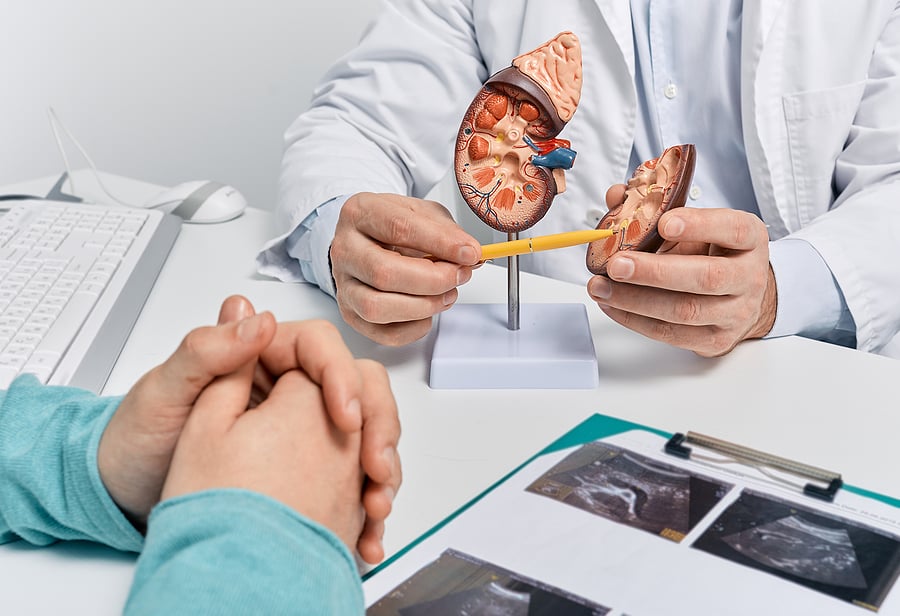What are kidney stones and how serious are they?
Kidney stones are a common problem affecting more than one in 10 people, according to the NHS, which says they can develop in one or both kidneys and usually affect people between the ages of 30-60.
They can be extremely painful, and in some cases can potentially lead to complications, including kidney infections or the kidney not working properly. So, what exactly are they and what do people need to know about them?
What are kidney stones?
GP Dr Babak Ashrafi, from Superdrug Online Doctor, explains that kidney stones are solid, crystalline formations that develop in the kidneys when there’s an accumulation of substances, such as calcium and phosphorus, in the urine, which clump together to form stones of varying sizes.
How serious are kidney stones?
The severity and impact of kidney stones varies, and depends on things like their size and location, says Ashrafi. “While smaller stones may pass through the urinary tract without causing significant issues, larger stones can lead to intense pain and complications,” he explains. “In extreme cases, they can lead to complications like urinary tract obstruction, kidney damage and infections.”
In most cases however, kidney stones will resolve on their own with increased fluid intake and pain management, although Ashrafi warns that larger or recurrent stones may, as McIntyre found, need medical intervention. “It’s crucial to seek prompt medical attention if symptoms persist or worsen,” stresses Ashrafi.
What are the symptoms?

Kidney stones can be very painful
Sometimes small kidney stones may not be noticed, and can be excreted in the urine without any discomfort. But larger kidney stones can cause symptoms, including pain in the side of the tummy, which may be severe and intense, although it can sometimes come and go, and feeling sick or vomiting.
“Kidney stones can be incredibly painful as they travel through the urinary tract, causing intense discomfort and often leading to symptoms like severe lower back or abdominal pain, blood in the urine, and more frequent urination,” says Ashrafi.
How are kidney stones treated?
Ashrafi says treatment options range from pain management and increased fluid intake to flush out the kidney stones, to lithotripsy – where high energy shock waves break the stones into pieces as small as grains of sand, which can then be passed from the body in the urine. Sometimes surgical removal, like McIntyre had, is required.
Why do people get kidney stones?
A number of factors can increase someone’s risk of kidney stones, including insufficient hydration, having a sedentary lifestyle and a diet with high levels of sodium, and possibly oxalate – a natural compound found in certain plants.

Staying well hydrated helps
“Not drinking enough water reduces the amount of urine you produce, making it harder for your body to dissolve calcium, oxalate and phosphorus,” explains Ashrafi. “This heightened concentration creates an environment where these substances are more likely to crystallise and form solid particles.”
Obesity is also linked to kidney stones. Ashrafi says: “Obesity in particular, contributes to heightened insulin resistance and can lead to a more sedentary lifestyle, promoting the crystallisation of the substances that lead to kidney stone formation.” He says diets associated with obesity, and particularly consuming high levels of salt and animal proteins, also increase the risk of kidney stones developing.
How can you avoid kidney stones?
Preventing kidney stones often involves adopting a healthier lifestyle, particularly ensuring you’re drinking enough water and eating a balanced diet that’s low in salt and oxalate-rich foods, says Ashrafi. “Regular physical activity and striving to reduce insulin levels in your blood can aid in weight management and reduce the risk of obesity-related factors that contribute to kidney stones.”
People with a family history of kidney stones or specific medical conditions should consult healthcare professionals for personalised prevention strategies. Ashrafi adds: “Overall, staying active and well-nourished is the key to avoiding kidney stones.”
The Press Association
Latest posts by The Press Association (see all)
- Dame Kelly Holmes: ‘Getting old is a privilege but ageing I don’t like’ - April 27, 2024
- Why is melanoma on the rise? As new personalised ‘gamechanger’ skin cancer jab is tested - April 27, 2024
- King to resume public duties after positive cancer treatment - April 26, 2024
- 3 recipes to make from the new Hairy Bikers cookbook - April 26, 2024
- World Penguin Day: Test your knowledge with our penguin-themed quiz - April 23, 2024





















